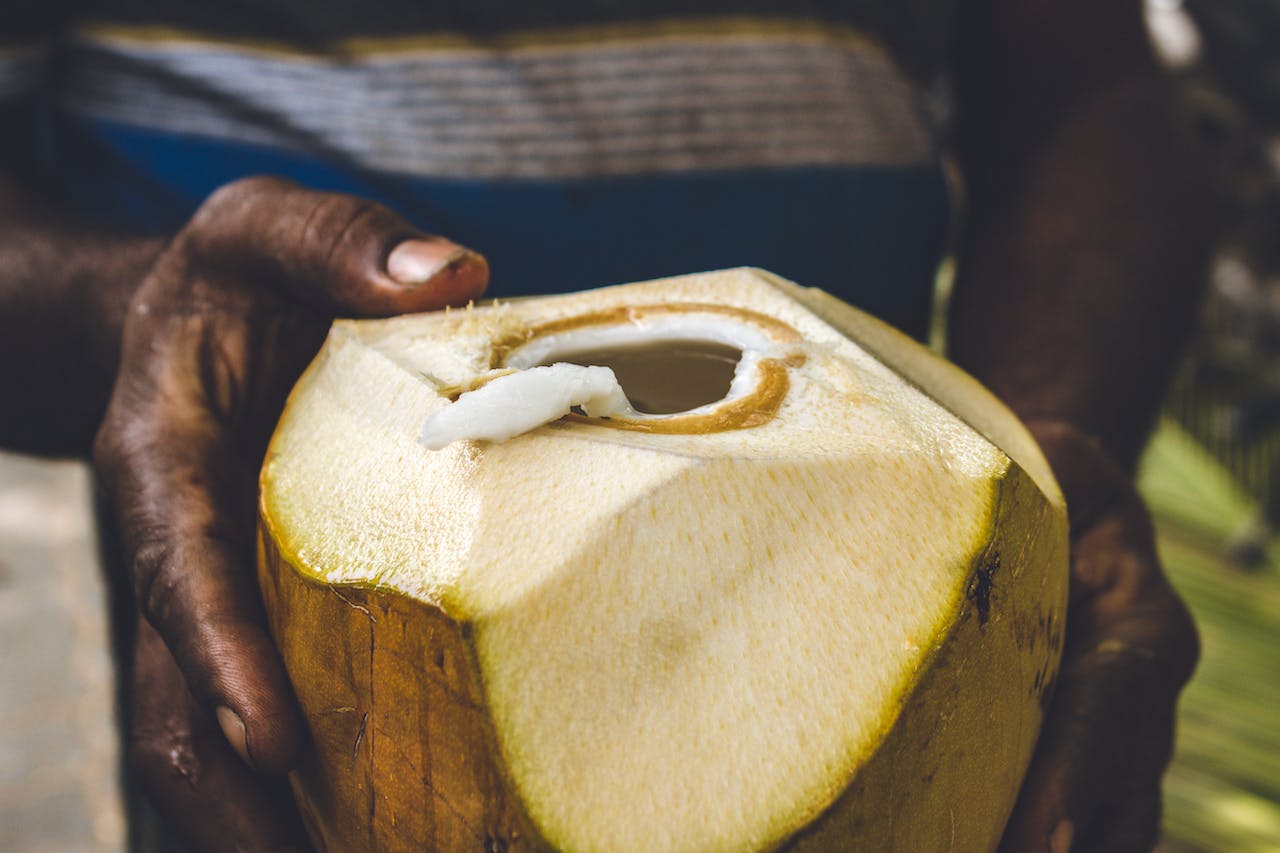
In a world where health-conscious choices dominate lifestyle discussions, the humble coconut emerges as a nutritional powerhouse, offering a myriad of benefits that extend beyond mere culinary delight.
From its versatile culinary applications to its diverse array of health advantages, coconut has rightfully earned its status as a superfood. As we delve into the depths of this tropical marvel, we uncover a treasure trove ofbenefits of eating coconutthat spans physical well-being, cognitive health, and even skincare.
Join us on this journey as we explore the intricate tapestry of the coconut's nutritional richness and unlock the secrets behind its many benefits.
What Is Coconut?
Coconuts are exotic, delicious fruits. Coconut trees are common in tropical areas. They permeate our lives like nectar. Every coconut tree portion meets our everyday needs. We receive coconut oil, water, milk, meat, wood for fire, husk for scrubber, and ropes from coconut trees. Coconut has cosmetic and therapeutic qualities.
Every Portion Of The Fruit Is Edible;
- The tasty white flesh may be eaten raw or dry. Indian chutney, curries, seafood stews, and rice dishes include raw meat.
- Shaved or shredded dry coconut flesh adds flavor and health to cookies, muffins, puddings, and ladoos.
- Coconut flour may replace wheat flour in baking. Coconut flour is gluten-free and carb-free while dieting.
- Many cuisines use coconut milk and cream made by squeezing grated raw flesh.
- Instant energy from tender coconut water. On a scorching day, it refreshes immediately.
Exploring The Health Benefits Of Coconut Water
Coconut water, often referred to as nature's sports drink, is not merely a refreshing tropical beverage; it is a reservoir of health benefits that significantly contribute to overall well-being.
As we delve into the virtues of coconut water, we uncover the myriad benefits of incorporating this natural elixir into our daily routines, reaffirming the phrase benefits of eating coconut.
Rehydration And Electrolyte Balance
The primary allure of coconut water lies in its exceptional ability to rehydrate the body. As a low-calorie, natural alternative to conventional sports drinks, coconut water boasts an impressive electrolyte profile.
It contains potassium, magnesium, and calcium—essential minerals that play a crucial role in maintaining proper fluid balance. These benefits of eating coconut extend beyond mere refreshment, offering a replenishing solution after physical exertion.
Nutrient-Rich Hydration
Unlike artificially flavored and sugar-laden beverages, coconut water provides a guilt-free, nutrient-rich hydration experience. The benefits of eating coconut in the form of coconut water include the intake of vital nutrients such as vitamin C, antioxidants, and amino acids.
This wholesome hydration not only quenches thirst but also nourishes the body, promoting optimal health.
Weight Management
For those on a weight management journey, the benefits of eating coconut, specifically in the form of coconut water, become particularly noteworthy. Its low-calorie content and natural sweetness make it a satisfying yet calorie-friendly choice.
The hydrating effect, coupled with a feeling of fullness, contributes to better appetite control, aligning with the broader benefits of eating coconut for a balanced diet.
Blood Pressure Regulation
Research suggests that the potassium content in coconut water may play a role in regulating blood pressure. Including this natural beverage in your diet could be a proactive step toward cardiovascular health.
The benefits of eating coconut extend to the cardiovascular system, offering a delicious and heart-friendly approach to maintaining blood pressure within healthy ranges.
Enhanced Athletic Performance
Athletes and fitness enthusiasts can amplify their performance by embracing the benefits of eating coconut, particularly in the form of coconut water. Its electrolyte composition aids in preventing dehydration during strenuous physical activities.
The rapid replenishment of electrolytes and hydration helps sustain energy levels, showcasing the practical benefits of eating coconut for those engaged in regular exercise.
Diabetic-Friendly Hydration
Individuals with diabetes often seek suitable beverage options that won't spike blood sugar levels. Coconut water emerges as a diabetic-friendly choice due to its low sugar content and the presence of fiber.
These benefits of eating coconut in moderation align with dietary recommendations for individuals managing diabetes, offering a flavorful alternative without compromising health.
Gastrointestinal Support
The benefits of eating coconut, specifically through its water, extend to digestive health. Coconut water contains fiber, which aids in promoting healthy digestion and preventing constipation.
This natural source of dietary fiber contributes to overall gastrointestinal well-being, emphasizing the holistic benefits of eating coconut for a happy and healthy digestive system.
Immune System Boost
The benefits of eating coconut water include supporting the immune system, thanks to the presence of vitamins and antioxidants in coconut water. Vitamin C, in particular, plays a vital role in immune function.
Regular consumption of coconut water can be viewed as a proactive measure to fortify the body's natural defense mechanisms—a testament to the immune-boosting benefits of eating coconut regularly.
Alkalizing Properties - The PH-Balancing
Coconut water is alkaline in nature, helping to maintain the body's pH balance. The benefits of eating coconut, specifically in the form of alkaline-rich coconut water, include counteracting the acidic effects of certain foods and promoting an alkaline environment within the body. This pH-balancing act contributes to overall health and well-being.
Antioxidant Defense
Antioxidants are instrumental in neutralizing free radicals, combating oxidative stress, and promoting anti-aging effects. Coconut water, with its antioxidant content, contributes to this defense mechanism.
By unlocking the antioxidant benefits of eating coconut, individuals can potentially slow down the aging process and enjoy healthier, more vibrant skin.
Manage Cholesterol With Coconut
In the pursuit of cardiovascular well-being, making heart-healthy choices is paramount. One such choice that continues to gain recognition is the inclusion of coconut in the diet, showcasing the benefits of eating coconut for managing cholesterol levels.
Contrary to outdated misconceptions, coconut, when consumed in moderation, can play a pivotal role in promoting heart health.
Cholesterol Management - The Role Of Coconut In Balancing Lipids
The benefits of eating coconut become particularly evident when delving into its impact on cholesterol levels. While coconut is known for its saturated fat content, it's crucial to recognize that not all saturated fats are created equal.
The specific type of saturated fats found in coconut, known as medium-chain triglycerides (MCTs), has been linked to favorable effects on lipid profiles. MCTs may contribute to a more balanced ratio of good (HDL) to bad (LDL) cholesterol, exemplifying the heart-healthy benefits of eating coconut.
MCTs And Cholesterol - Navigating The Science Behind The Benefits Of Eating Coconut
Understanding the science behind the benefits of eating coconut requires a closer look at MCTs. Research suggests that MCTs can influence the metabolism of cholesterol in a way that favors the reduction of LDL cholesterol—the type often associated with cardiovascular risk.
As we navigate the intricate relationship between MCTs and cholesterol, it becomes evident that incorporating coconut into the diet can be a strategic move in the pursuit of heart health.
Coconut Oil - A Heart-Friendly Culinary Companion
One of the primary vehicles for experiencing the benefits of eating coconut in terms of cholesterol management is coconut oil. A staple in many cuisines, coconut oil contains a significant proportion of MCTs, making it a valuable addition to heart-healthy recipes.
Substituting traditional cooking oils with coconut oil becomes a flavorful choice that not only enhances the taste of dishes but also contributes to the potential benefits of eating coconut for cholesterol health.
The Myth Of Saturated Fat - Dispelling Misconceptions About Coconut
Addressing misconceptions surrounding the relationship between saturated fat and heart health is essential when discussing the benefits of eating coconut. The outdated belief that all saturated fats are detrimental to cardiovascular health has been debunked by evolving research.
Recognizing the unique composition of coconut's saturated fats, especially the MCTs, challenges the conventional narrative and highlights the nuanced benefits of eating coconut for those seeking heart-healthy dietary choices.
Dietary Balance - Integrating Coconut Into A Heart-Conscious Diet
For individuals actively managing their cholesterol levels, dietary choices play a pivotal role. The benefits of eating coconut in moderation align with the broader concept of a balanced and heart-conscious diet.
By incorporating coconut in various forms—be it coconut oil, coconut milk, or shredded coconut—individuals can diversify their nutrient intake while potentially supporting cholesterol management.
The key lies in mindful consumption and embracing the benefits of eating coconut as part of an overall heart-healthy lifestyle.
Coconut And Triglycerides - An Insight Into Comprehensive Cardiovascular Benefits
Beyond its influence on cholesterol, coconut's impact extends to triglyceride levels—a crucial aspect of cardiovascular health. Emerging studies suggest that the consumption of coconut, particularly the MCTs, may contribute to lowering triglyceride levels.
This comprehensive approach to cardiovascular benefits reinforces the multifaceted advantages of eating coconut for those prioritizing heart health.
Why Is Eating Raw Coconut Good For Your Health?
Because it's nutritious, it is abundant in copper, selenium, iron, phosphorus, potassium, magnesium, and zinc. It also contains healthy fat that improves bodily function. Raw coconut folate, vitamin C, and thiamin, albeit tiny, may improve your health over time.
Raw Coconut May Prevent Constipation
Low-fiber diets cause constipation. Raw coconut will prevent such issues, so you may take a calm pill if you consume it. Did you know coconut has 61% fiber? Your gut health and bowel movement are in control.
It Will Keep Your Skin And Hair In Good Shape
Try raw coconut if dry skin and curly hair are annoying. Coconut fat hydrates and supples skin, preventing early wrinkles.
It is rich in monolaurin and lauric acid, making it antibacterial and antifungal. Therefore, it also treats acne and scalp issues nicely. Its antioxidants prevent cell damage, giving you youthful attractiveness.
Raw Coconut Aids In Weight Loss
A nice snack to satisfy hunger. Plus, it controls cholesterol. Coconut triglycerides burn fat quickly and reduce appetite. That's why a 2018 PLOS ONE research recommends it for low-fat diets.
It may also give you a sculpted jawline since chewing it works out your facial muscles.
Raw Coconut May Boost Immunity.
COVID-19 has made "immunity" a buzzword. Raw coconut is antibacterial and antiviral, protecting you from all kinds of problems. It helps throat and bronchitis sufferers also.
The Transformative Benefits Of Eating Coconut For Hair
Promoting Hair Growth
The rich nutritional profile of coconut contributes to healthier hair growth. Essential fatty acids, present in abundance, nourish the hair follicles, promoting more muscular and more resilient strands.
Regular inclusion of coconut in your diet can be a natural way to support and enhance the growth of luscious locks.
Preventing Hair Loss
Coconut is a source of medium-chain triglycerides (MCTs), known for their potential to reduce protein loss in hair. By preventing protein loss, coconut helps maintain hair strength and prevent hair breakage, ultimately contributing to a reduction in hair loss.
Embracing the benefits of eating coconut becomes a holistic approach to preserving your hair's thickness and vitality.
Moisturizing From Within
Dehydrated hair can lead to a myriad of issues, including dullness and breakage. The hydrating properties of coconut, when consumed, extend to your hair as well.
The benefits of eating coconut include improved moisture retention in the scalp, preventing dryness, and promoting a healthier, more vibrant mane.
Reducing Dandruff And Scalp Issues
Coconut's antifungal and antibacterial properties can address common scalp issues such as dandruff. The medium-chain fatty acids in coconut oil exhibit antimicrobial activity, helping to keep the scalp in optimal condition.
Regular consumption of coconut contributes to these benefits, promoting a clean and healthy scalp environment.
Enhancing Hair Texture
The proteins and vitamins found in coconut contribute to enhanced hair texture. Proteins are the building blocks of hair, and coconut, with its protein content, helps strengthen each strand.
The benefits of eating coconut extend to the infusion of vitamins like vitamin E, which nourishes the hair, leaving it softer and more manageable.
Preventing Premature Graying
Premature graying can be attributed to oxidative stress. Coconut, with its antioxidant properties, can help combat oxidative damage, potentially slowing down the graying process. Including coconut in your diet becomes a proactive step toward maintaining the natural color of your hair.
Improving Blood Circulation To The Scalp
A healthy scalp requires adequate blood circulation, ensuring that essential nutrients reach the hair follicles. Coconut's nutrient-rich composition supports improved blood flow to the scalp, facilitating the delivery of nutrients that are vital for overall hair health.
Reducing Hair Breakage
Brittle hair is prone to breakage, and the benefits of eating coconut lie in its ability to strengthen hair strands. The combination of healthy fats, proteins, and vitamins in coconut nourishes the hair from within, reducing the likelihood of breakage and split ends.
Harnessing The Beauty Benefits Of Eating Coconut For Skin
Hydration And Moisture Retention - Skin Nourishment Through Coconut Consumption
One of the primary benefits of eating coconut for the skin is its exceptional ability to hydrate and moisturize.
The water content in coconut, along with its healthy fats, helps maintain skin hydration from the inside out. Regular consumption contributes to a supple and well-nourished complexion.
Combatting Dryness And Flakiness - The Moisturizing Magic Of Coconut
The benefits of eating coconut can alleviate dry and flaky skin. The fats present in coconut provide a natural moisturizing effect, combating dryness and preventing flakiness.
Including coconut in your diet becomes a delicious and nutritious approach to achieving smoother and more radiant skin.
Reducing Inflammation - Anti-Inflammatory Properties Of Coconut
Coconut possesses anti-inflammatory properties that can benefit the skin by reducing redness, swelling, and inflammation.
The antioxidants and fatty acids in coconut contribute to a calming effect, making it a valuable addition to the diet for those with inflammatory skin conditions.
Promoting Collagen Production - Youthful Skin With Coconut Nutrients
Collagen is a crucial protein for maintaining skin elasticity and youthfulness. The benefits of eating coconut include nutrients like copper and vitamin C, which play a role in collagen production.
By promoting collagen synthesis, coconut contributes to firmer and more resilient skin, minimizing the appearance of fine lines and wrinkles.
Sun Protection From Within - Boosting Skin's Natural Defense With Coconut
While not a replacement for sunscreen, the antioxidants in coconut can provide an additional layer of protection against the damaging effects of UV rays.
The benefits of eating coconut for the skin extend to a potential boost in the skin's natural defense mechanisms, helping to mitigate sun-induced skin damage.
Healing Properties For Skin Ailments - Coconut's Antimicrobial Benefits
Coconut's antimicrobial and antibacterial properties make it beneficial for individuals with skin ailments.
The medium-chain fatty acids in coconut oil, when consumed, can help address issues like acne and other skin infections. The internal benefits of eating coconut contribute to more precise and healthier skin.
Brightening Complexion - Vitamin C And Antioxidants In Coconut
Vitamin C, present in coconut, is known for its skin-brightening properties—the antioxidants in coconut combat free radicals, contributing to a more luminous complexion. The benefits of eating coconut extend to achieving a natural radiance that comes from nourished and revitalized skin.
Soothing Irritated Skin - Coconut's Calming Effect
For individuals with sensitive or irritated skin, the benefits of eating coconut lie in its calming effect. Whether dealing with redness, itching, or inflammation, the nutrients in coconut can contribute to soothing the skin from the inside, promoting a healthier and more comfortable skin experience.
Cleansing And Detoxification - Clearer Skin With Coconut
Coconut's detoxifying properties can contribute to clearer skin by aiding in the removal of toxins from the body. The benefits of eating coconut include supporting the liver's natural detox processes, which, in turn, can reflect on the skin's clarity and overall health.
Balancing Oil Production - Regulating Sebum With Coconut Nutrients
For those with oily or acne-prone skin, the benefits of eating coconut include a potential regulation of sebum production. The medium-chain fatty acids in coconut oil can help balance oil levels, reducing the likelihood of clogged pores and breakouts.
How To Select And Store Coconut For The Best Quality
Coconut Oil
You have several possibilities based on your usage. Coconut oil is usually virgin or refined (or all-purpose). Unrefined virgin coconut oil may be used to cook at 350 degrees F or moisturize skin and hair. All-purpose coconut oil can cook up to 400 degrees F due to its higher smoking point.
It's a better neutral cooking oil since it doesn't smell or taste tropical like pure coconut oil. Coconut oil is sold alongside other cooking oils at supermarkets and natural food shops.
No refrigeration is needed for coconut oil. Keep it cold and dry.
Coconut oil solidifies at lower temperatures and liquidates at warmer temperatures. It doesn't affect the oil's flavor or quality, but it's worth knowing before using it. right arrow
Coconut Milk
Coconut milk is available in cans in full or reduced-fat, depending on your diet. Make sure your brand has no additives. Coconut milk should be coconut and water. Cans may be kept unopened in the pantry.
Coconut drinks are nondairy alternatives to milk, unlike canned coconut milk. Look for unsweetened. You will get sugar in coconut beverages since they're sweet. These are generally in the fridge or shelf-stable packaging. They require refrigeration after opening.
Coconut Water
Coconut water purchasing is mostly about flavor. However, choose sugar-free drinks. Some flavored versions incorporate no-calorie Stevia. Refrigerated cases usually include them.
Coconut Flour
Shop for coconut flour alongside other flours. Bags are easy to acquire online. Coconut flour should be kept cold, dry, and sealed away from the sun.
Whole Coconut
Shredded or flaked coconut is more straightforward to purchase than whole coconuts, which your grocery store may carry. Like most of these goods, make sure your coconut is "unsweetened." Look for them in grocery store baking aisles or bulk bins. Keep cold and dry in your pantry.
Frequently Asked Questions
What Are The Benefits Of Eating Coconuts?
Coconut meat and oil are rich in heart-healthy HDL cholesterol. Coconut controls blood sugar since it's rich in fiber and low in carbohydrates. Coconut flesh and water are rich in antioxidants that protect cells.
What Are The Hidden Benefits Of Coconut?
Coconut reduces inflammation. Antioxidant polyphenols may fight oxidative free radicals that cause inflammation." 1 For maximum antioxidant and anti-inflammatory advantages, Hewlings suggests fresh, unprocessed raw coconut and coconut oil.
What Are The Uses Of Coconut?
Coconut palms are among nature's most attractive and lucrative plants. Today, soap, cosmetics, meals, and pharmaceuticals employ coconut oils, fiber, and charcoal. Coconut palm is a widely produced palm.
Does Eating Coconut Help The Skin?
Coconut lipids reduce skin damage by reducing dirt and bacteria-attracting pores. The toning quality of coconut helps prevent acne by reducing skin pores and leaving it radiant.
How Does Coconut Aid In Digestion And Overall Gastrointestinal Health?
Coconut's fiber content supports digestive health by promoting regular bowel movements and contributing to a healthy gut environment, aiding in overall gastrointestinal well-being.
To Summarize
As we conclude our exploration of the benefits of eating coconut, it's evident that this tropical marvel transcends its culinary appeal. From the nutritional richness of coconut water and meat to the cognitive benefits of MCTs and the heart-healthy properties of coconut, every facet of this fruit contributes to a holistic approach to well-being. Moreover, the skincare potential of coconut oil adds a layer of external beauty to its already impressive resume.
In a world where dietary choices are pivotal to our health, coconut stands as a testament to the notion that delicious and nutritious are not mutually exclusive. The next time you savor the taste of coconut or incorporate it into your recipes, remember that you're not just enjoying a tropical delight – you're unlocking a treasure chest of health benefits that span from the inside out. The benefits of eating coconut are not just a phrase; they are a reality waiting to be embraced for a healthier, more vibrant life.




